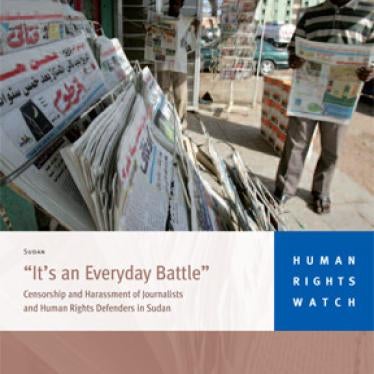(New York) - The Sudanese government is censoring the media and cracking down on human rights activists and journalists who speak out on human rights and justice, Human Rights Watch said in a report today. Harassment, repression and censorship has worsened in the last year, particularly since the International Criminal Court's (ICC) request for an arrest warrant for President Omar al-Bashir in July 2008.
The 21-page report, "'It's an Everyday Battle': Censorship and Harassment of Journalists and Human Rights Defenders in Sudan," documents the government's efforts to repress those who seek to report on issues it considers sensitive, including human rights, the conflict in Darfur, and the ICC's investigation.
"Today in Khartoum it is unsafe to criticize the Khartoum government or to call for justice for the victims of horrific crimes in Darfur," said Georgette Gagnon, Africa director at Human Rights Watch. "We are deeply concerned that President Bashir will use the issuance of an ICC warrant against him as an excuse for an even more brutal crackdown on free expression."
Over the past several months, National Intelligence and Security Services (NISS) agents have detained and ill-treated three high-profile activists who had spoken out in support of human rights and international justice. Two were beaten severely while in custody. In the last year, security agents have also arbitrarily arrested and detained at least three journalists who have written or published articles that directly or indirectly criticize the majority National Congress Party (NCP).
The Khartoum government controls most of the country's broadcast media, which are largely owned or run by the government. In addition, the National Press Council, which is responsible for licensing and registering journalists and newspapers, is controlled by the government through the minister of information and communications.
The report describes how since February 2008 NISS agents have systematically visited the few independent newspapers operating in Khartoum each day to review final editions of papers and remove all or parts of articles they regard as sensitive or critical of the government. The NISS has temporarily suspended at least five newspapers following such articles, two of them repeatedly.
The combination of government control, daily censorship of independent media, and abuse and harassment of journalists by the NISS, is a severe barrier to freedom of expression and access to information in Sudan. Any violations of freedom of expression are particularly of concern with national elections scheduled for mid-2009. The elections - Sudan's first in more than 20 years - are required under the Comprehensive Peace Agreement that ended the war between North and Southern Sudan in 2005.
"Free and fair elections require a free and open media," said Gagnon. "Khartoum's repressive practices and abuse of those who criticize it put such elections at great risk."






